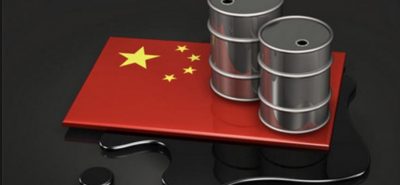China’s Gold Backed Petro-Yuan Challenges US Dollar Hegemony

Its introduction poses the first ever challenge to petro-dollar dominance.
China is the world’s largest oil importing/consuming nation. Gold-backed petro-yuan futures trading began Monday on the Shanghai International Energy Exchange, part of the Shanghai Futures Exchange – letting Chinese and foreign traders buy oil in yuan instead of dollars.
For the first time, petro-yuan trading challenges the Wall Street/London-dominated oil petro-dollar futures market longer-term.
According to OilPrice.com, Monday trading in Shanghai began “with a bang,” demand high “with 15.4 million barrels of crude for delivery in September” transacted in two-and-a-half hours, the length of first-day trading.
US-sanctioned nations Russia, Iran and Venezuela can benefit by avoiding oil trading in dollars.
Russia and China already conduct bilateral trade in their national currencies. Last September, Venezuela began selling oil contracts in euros. Now it can trade in yuan as well.
Over time, US sanctions could be neutralized, its attempt to dominate other nations economically and financially weakened, perhaps bypassed by targeted countries, avoiding dollar trade entirely.
Oil analyst Li Li said China-introduced petro-yuan futures contacts “is an innovative way to fill in the void of a voice representing buyers in Asia. With this launch, the market will pay more attention to China’s demand story.”
It’s shaking up the oil futures market. According to financial analyst Hayden Briscoe, “(t)his is the single biggest change in capital markets, maybe of all time” – enhancing oil trading in yuan at the expense of the dollar.
Economist Carl Weinberg believes Beijing will likely “compel” Saudi Arabia to abandon the petrodollar for the yuan in oil sales to China – a move he said will likely push the oil market in the same direction, a major development if he’s right.
In 2016, Russia’s St. Petersburg exchange began Urals oil futures trading in rubles. Moscow and Beijing promote bilateral trade in their national currencies.
Russia is China’s largest supplier of crude, facilitated by two Sino/Russian oil pipelines. The second one began operating in January.
At least 19 foreign brokers registered to trade oil contracts on the Shanghai exchange, more likely to follow, increasing volume – at the expense of dominant dollar oil trading.
Hedge fund manager Adam Levinson called the petro-yuan a “huge story,” increasing the importance of the Chinese currency in commodity trading.
Post-WW II, dollar transactions dominated international trade – because it’s a freely convertible liquid currency.
Nations trading more in their national currencies, along with the petro-yuan’s introduction, could prove a game-changer longer-term.
For now, the dollar as the world’s reserve currency remains dominant.
Competition from the yuan and other currencies could considerably weaken its dominance in the years ahead.
Stephen Lendman is a Research Associate of the CRG, Correspondent of Global Research based in Chicago.
VISIT MY NEW WEB SITE: stephenlendman.org (Home – Stephen Lendman). Contact at [email protected].
My newest book as editor and contributor is titled “Flashpoint in Ukraine: How the US Drive for Hegemony Risks WW III.”

